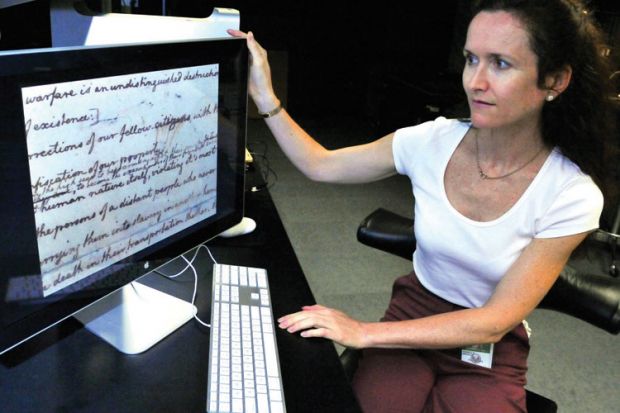Source: Getty
Da Vinci’s is not the only code: legacy software must be cracked as well
The University of Oxford’s Bodleian Libraries have launched a scheme to help train more digital librarians able to navigate everything from a Conservative Party archive to antiquated word processing software.
From September, two successful applicants will embark on a two-year training programme. This will combine intensive paid work experience in the library with studying via distance learning for a diploma in archive administration from Aberystwyth University. Course fees will be met in full by the scheme, which is part of the Heritage Lottery Fund’s Skills for the Future programme (designed to address identified skills shortages in the heritage sector).
The training, said Susan Thomas, the Bodleian’s head of archives and modern manuscripts, would suit “either new graduates or those looking for a career change. The traditional way to get into archiving was through voluntary or paid experience followed by a postgraduate qualification. We will be offering training from scratch, but applicants need to be committed, since they will be studying as well as working on the archives.”
Trainees can expect to gain a fairly broad range of experience, including work on ongoing archives such as the recently acquired Oxfam Archive and the Conservative Party Archive, which has been building up since 1978.
Yet most of the material they deal with will be “born-digital”, so they will need to get to grips with the challenges of preserving data stored on floppy disks, long-defunct word processing software and operating systems rapidly going out of date.
“It is very much an evolving discipline,” said Ms Thomas. “New techniques are being developed all the time. Trainees will get a chance to work with software engineers on problem-solving and to discuss with researchers how they want email archives delivered to them, and how they want to interrogate such archives.”
Although the training is well suited to those who want to go on to work in research libraries, Ms Thomas stressed that it would also offer generic archiving skills around “interpreting the collection for people and using it to tell a story, through organising classes, putting on displays or temporary exhibitions. Using archival material to tell a story is equally relevant for those who go on to work in a corporate setting.”
The new generation archivists will be based at the recently refurbished Weston Library, with easy access to the Bodleian’s outstanding Special Collections. They will also get a chance to study alongside trainee librarians from across all the university’s holdings, including scientific, medical and hospital libraries. It is hoped, therefore, that the scheme will attract people with qualifications in science and maths subjects as well as the humanities.
Current plans envisage six trainees taking part in the scheme, which continues until 2019 and enjoys support from the Stationers’ Company and the Strachey Trust, although this could be expanded if the Bodleian secures additional funding.
Applications for the first two places close on 9 June 2014.
matthew.reisz@tsleducation.com
Record keepers: other roles in the field
University of Cambridge
Cambridge University Library is looking for a candidate to fill the new post of head of scholarly communication.
Closing date for applications: 6 June 2014
View the full job description and apply for this role
Anglia Ruskin University
A full-time acquisitions assistant is being sought for Anglia Ruskin University’s library.
Closing date for applications: 5 June 2014
View the full job description and apply for this role
Queen Mary University of London
There is an opening for a database officer within Queen Mary University of London’s development directorate.
Closing date for applications: 20 June 2014
View the full job description and apply for this role
Appointments
Two University of Dundee academics have been elected to two external positions. Irwin McLean, professor of human genetics, scientific director of the Centre for Dermatology and Genetic Medicine and head of the division of molecular medicine, has been made a fellow of the Royal Society, while Blair Smith, consultant in pain medicine at NHS Tayside and professor of population health science, has been appointed national clinical lead for chronic pain in Scotland.
David Littlejohn has been made the new executive dean of the Faculty of Science at the University of Strathclyde. He will take up his position in August.
Rajani Naidoo has been appointed professor of higher education management and director of the International Centre for Higher Education Management at the University of Bath.
Helga Drummond has been appointed visiting professor of business at Gresham College, London. Professor Drummond is currently professor of decision sciences at the University of Liverpool’s Management School.
The University of Salford has confirmed the appointment of Baroness Beverley of Stretford as its new chair of council from 1 August.
Kim Cornish, developmental neuroscientist at Monash University in Australia, has been appointed chair of the country’s Heads of Departments and Schools of Psychology Association (HODSPA).
Register to continue
Why register?
- Registration is free and only takes a moment
- Once registered, you can read 3 articles a month
- Sign up for our newsletter
Subscribe
Or subscribe for unlimited access to:
- Unlimited access to news, views, insights & reviews
- Digital editions
- Digital access to THE’s university and college rankings analysis
Already registered or a current subscriber? Login

